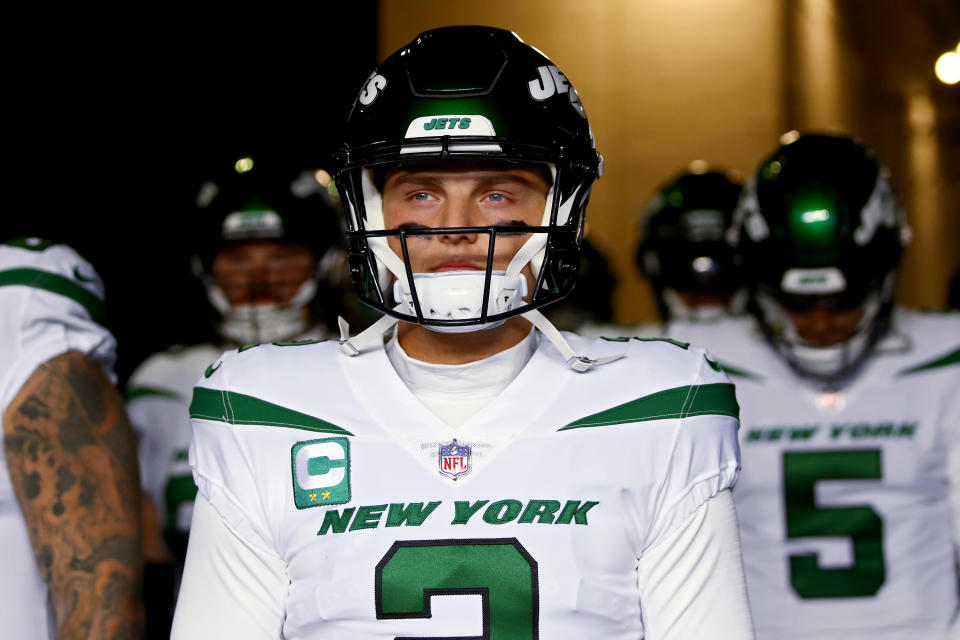The jarring thing is how quickly and firmly he said “no.”
Still sporting eye black, Zach Wilson stood before reporters and cameras underneath Gillette Stadium on Sunday evening for the customary postgame interview session. His New York Jets had just lost 10-3 on a last-second punt return touchdown from New England Patriots rookie Marcus Jones, a thrilling finish for the home team and their chilly fans but another close Jets loss to their supposed rival, the second in less than a month.
New York had scored three points. Three.
Wilson had completed just 9 of 22 pass attempts for 77 yards, and was sacked four times. If there was any silver lining to an otherwise terrible performance for the second-year player, it’s that he at least didn’t turn the ball over, with no interceptions and no lost fumbles. Though even there he was lucky: Patriots veteran safety Devin McCourty, who rarely makes such mistakes and picked off Wilson twice in their game last month, dropped a gift-wrapped turnover in the final minute of the first half when Wilson floated a ball over the middle of the field.
But in an era when the NFL has calibrated the rules to maximize yards and scoring, if your defense holds an offense — even one that has been as rocky as New England’s this season — to just three points, your team should be sailing to an easy win.
And if your defense holds an offense to three points and you, as the leader of the offense, can’t find a way to put more than three on the board, your only reaction should be profuse apologizing to your teammates.
Those guys on defense, they did their job.
Zach Wilson did not.
And yet there he was, the No. 2 pick in the 2021 draft, the alleged face of the franchise, in front of a Jets-logoed backdrop and wearing a Jets-logoed winter hat, dismissing any idea that he hadn’t pulled his weight.
“As an offense, you guys were only able to score three points, the defense only lets up three points, do you feel like you let the defense down at all?” Wilson was asked.
“No. No,” Wilson said immediately, scratching his nose and turning away from the reporter.
NFL quarterbacks have long gotten far too much credit for wins and often far too much blame for losses. But they also, in more recent years, have seen their salaries skyrocket to the point that many veterans make two to three times what the next-highest paid teammate earns. Even Wilson, still on his slotted rookie deal, is one of the 10 highest-paid Jets this season.
When you play the position that gets the most attention and by far the most money, and is the de facto leader of the roster, it comes with certain responsibilities.
First and foremost: accountability.
Wilson showed none Sunday. Not just to fans, but more importantly to the very men he’s supposed to be leading. And it wasn’t like he was stellar and the receivers let him down. Wilson was bad; he’s been bad. You could make the argument he’s the worst starting QB in the league this season.
The fact that he has a strong defense makes it worse. He doesn’t have to put 35 points on the board every week and hope for the best. The Jets’ defense is allowing only 20.7 points a game, and over the past five weeks has allowed an average of only 13.6.
Receiver Garrett Wilson said after the loss, “This s*** is not OK. Straight up, it’s not OK.”
When head coach Robert Saleh was asked about the offense in the second half specifically, when New York mustered 2 total yards (no, really), he couldn’t muster anything more than, “It was dogs***.”


Wilson’s teammates certainly noticed his flippant response. One Sunday report said Wilson’s demeanor after the loss gave the impression that he doesn’t believe he’s the problem. On Monday, there was another report saying “raw feelings” remain among defensive players over Wilson’s refusal to be accountable for his group’s failures.
Also on Monday, defensive end John Franklin-Myers and rookie Sauce Gardner were on Twitter explaining that they “accidentally” liked tweets that were critical of Wilson.
The shame of it, again, is that New York’s defense is playing so well that the team doesn’t need Wilson to be a world beater. The Jets need him to be just competent.
Look around, Zach: The quarterbacks who are true leaders deflect the praise in wins and take the blame publicly in losses — even when it isn’t their fault.
Tom Brady worked with some truly terrible receiving groups during his Patriots tenure. (You were like 6 years old, but look up New England’s 2006 roster sometime. It was hot garbage, and Brady got them to the AFC title game.) But he always pointed back at himself if the offense struggled. When Buffalo’s Josh Allen plays poorly, he owns it. Russell Wilson‘s Denver Broncos tenure has been nothing but a disappointment, and he hasn’t once tried to pawn the blame off on anyone else.
If Wilson can’t be bothered to study other quarterbacks, he can instead look at one of his teammates. Special teams captain Justin Hardee appeared to be on the verge of tears as he put the loss entirely on himself as the leader of the unit that gave up the game-winning touchdown Sunday.
Accepting blame after losses is not to say you don’t express frustration behind closed doors, if a receiver ran the wrong route or the offensive line is missing assignments. Of course, constructive criticism lands better when it’s clear you’re being just as demanding of yourself as you are of others.
But in front of cameras, you’re the leader, kid.
It’s past time to act like it.
